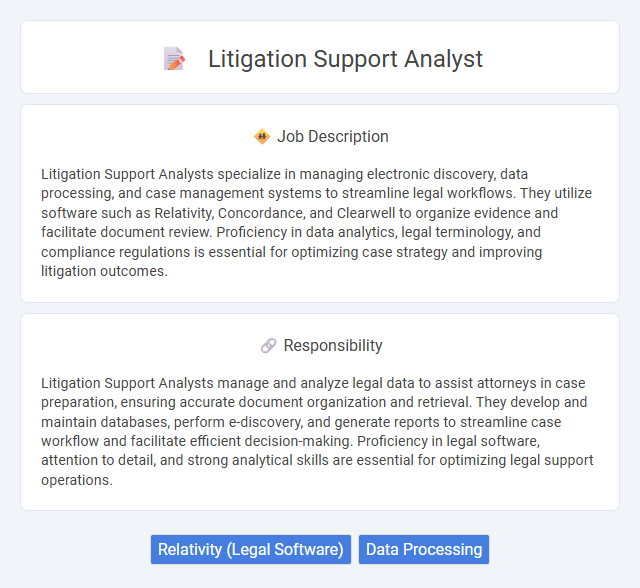
Litigation Support Analysts specialize in managing electronic discovery, data processing, and case management systems to streamline legal workflows. They utilize software such as Relativity, Concordance, and Clearwell to organize evidence and facilitate document review. Proficiency in data analytics, legal terminology, and compliance regulations is essential for optimizing case strategy and improving litigation outcomes.
Individuals with strong analytical skills and attention to detail are likely suitable for a Litigation Support Analyst role due to the job's demand for organizing complex legal data and supporting case preparation. Those who thrive in high-pressure environments and possess proficiency in technology and legal software may find this position aligns well with their strengths. Conversely, candidates who prefer less structured tasks or have difficulty managing large volumes of information might face challenges adapting to the role's requirements.
Qualification
A Litigation Support Analyst requires expertise in eDiscovery tools such as Relativity or Concordance, proficiency in data management, and strong analytical skills. Advanced knowledge of legal procedures, document review processes, and the ability to manage large datasets under tight deadlines are essential qualifications. Experience with SQL, data visualization software, and excellent communication skills to collaborate with legal teams enhance effectiveness in this role.
Responsibility
Litigation Support Analysts manage and analyze legal data to assist attorneys in case preparation, ensuring accurate document organization and retrieval. They develop and maintain databases, perform e-discovery, and generate reports to streamline case workflow and facilitate efficient decision-making. Proficiency in legal software, attention to detail, and strong analytical skills are essential for optimizing legal support operations.
Benefit
A Litigation Support Analyst likely improves case management efficiency by organizing and analyzing complex legal data, which could enhance the accuracy of litigation strategies. They may reduce the time spent on information retrieval, potentially leading to faster case resolutions and cost savings for law firms. Their expertise in technology tools might also assist attorneys in presenting evidence more effectively, possibly increasing the chances of favorable outcomes.
Challenge
A Litigation Support Analyst role likely involves navigating complex data management challenges that require meticulous attention to detail and advanced technical skills. The position probably demands the ability to analyze large volumes of legal documents and data, which may involve intricate software systems and frequent updates. Success in this role depends on effectively balancing technical proficiency with strategic problem-solving under tight deadlines.
Career Advancement
Litigation Support Analysts play a crucial role in managing electronic discovery, data analysis, and case preparation, which enhances their expertise in legal technology and case management software. Mastery of these skills can lead to career advancement opportunities such as Senior Litigation Support Analyst, eDiscovery Specialist, or Legal Technology Consultant. Progression often involves gaining certifications like Certified E-Discovery Specialist (CEDS) and developing leadership skills to manage complex litigation projects and teams.
Key Terms
Relativity (Legal Software)
A Litigation Support Analyst specializing in Relativity manages electronic discovery projects by organizing, processing, and reviewing vast datasets within the Relativity legal software platform. Expertise in Relativity's tools such as TAR (Technology Assisted Review), data culling, and advanced search analytics enhances case strategy and document review efficiency. Proficiency in managing Relativity databases, workflow automation, and producing litigation-ready reports is crucial for supporting legal teams through complex eDiscovery processes.
Data Processing
Litigation Support Analysts specialize in data processing to organize, review, and analyze large volumes of legal documents efficiently using advanced software tools like Relativity and Concordance. Their expertise in extracting relevant information, managing data integrity, and supporting discovery phases ensures accurate case preparation and compliance with legal standards. Proficiency in SQL, data visualization, and e-discovery platforms enhances their ability to streamline case workflows and optimize data-driven insights for litigation teams.
 kuljobs.com
kuljobs.com